#iot in healthcare trends
Link
0 notes
Link
Evolution of complementing technologies, such as Big Data and Artificial Intelligence drives the demand for an IoT (Internet of Things) in the healthcare...
0 notes
Link
The global Internet of Things (IoT) in healthcare market size is anticipated to reach over USD 169 billion by 2025.
0 notes
Text
Dominating the Market with Cloud Power

Explore how leveraging cloud technology can help businesses dominate the market. Learn how cloud power boosts scalability, reduces costs, enhances innovation, and provides a competitive edge in today's digital landscape. Visit now to read more: Dominating the Market with Cloud Power
#ai-driven cloud platforms#azure cloud platform#business agility with cloud#business innovation with cloud#capital one cloud transformation#cloud adoption in media and entertainment#cloud computing and iot#cloud computing for business growth#cloud computing for financial institutions#cloud computing for start-ups#cloud computing for travel industry#cloud computing in healthcare#cloud computing landscape#Cloud Computing solutions#cloud for operational excellence#cloud infrastructure as a service (iaas)#cloud migration benefits#cloud scalability for enterprises#cloud security and disaster recovery#cloud solutions for competitive advantage#cloud solutions for modern businesses#Cloud storage solutions#cloud technology trends#cloud transformation#cloud-based content management#cloud-based machine learning#cost-efficient cloud services#customer experience enhancement with cloud#data analytics with cloud#digital transformation with cloud
0 notes
Text
Unleashing the Potentials of Blockchain-Based Solutions
The Future of Decentralization in Blockchain: Unleashing the Potentials of Blockchain-Based Solutions
Introduction
The digital landscape is rapidly evolving. At the heart of this transformation lies blockchain technology. While often associated with cryptocurrencies like Bitcoin and Ethereum, blockchain’s true potential extends far beyond digital currencies. It promises a decentralized future…
#blockchain#blockchain applications#blockchain governance#blockchain technology#blockchain trends#cryptocurrency#DAOs#De Beers#decentralization#decentralized exchanges#decentralized finance#DeFi#energy consumption#Estonia#future of blockchain#governance#healthcare#interoperability#IoT#privacy solutions#regulation#scalability#security#smart contracts#stablecoins#supply chain management#tokenization#transparency#VeChain
0 notes
Text
Emerging Tech Trends in the Internet of Things (IoT)
Introduction
The Internet of Things (IoT) is transforming our world by connecting devices and enabling smarter, more efficient interactions. In everything from smart homes to industrial automation, the IoT is leading a revolution in our living and working environments. In this article, TechtoIO explores the emerging tech trends in IoT, highlighting the innovations and advancements that are shaping the future. Read to continue link
#Innovation Insights#Tags5G IoT#AI in IoT#autonomous vehicles IoT#big data IoT#edge computing IoT#future of IoT#IIoT#industrial IoT#Internet of Things#IoT data analytics#IoT healthcare#IoT innovations#IoT security#IoT technology#IoT trends#smart cities IoT#smart homes#wearable IoT#Technology#Science#business tech#Adobe cloud#Trends#Nvidia Drive#Analysis#Tech news#Science updates#Digital advancements#Tech trends
1 note
·
View note
Text
Exploring the Future of IoT | Internet of Things
Internet of Things (IoT) has already transformed the way we perceive and interact with technology connecting everyday objects to the digital world. As we navigate through a rapidly evolving technological landscape it becomes crucial to delve deeper into the future of IoT and the endless possibilities it holds. Let’s explore the exciting advancements and emerging trends that will shape the future…
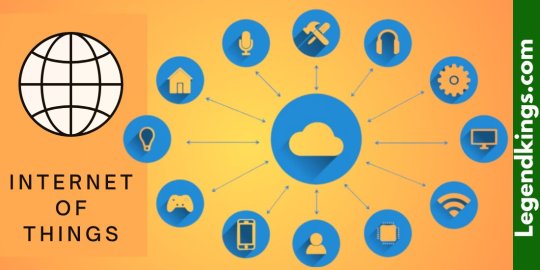
View On WordPress
#connected devices#Data Analytics#Emerging IoT Technologies#Future Technology#Industrial IoT#IoT Applications#IoT Automation#IoT Connectivity#IoT Data Privacy#IoT Ecosystem#IoT in Agriculture#IoT in Healthcare#IoT Industry Insights#IoT Infrastructure#IoT Innovations#IoT Security#IoT Sensors#IoT Sustainability#IoT Trends#Smart Homes
0 notes
Text
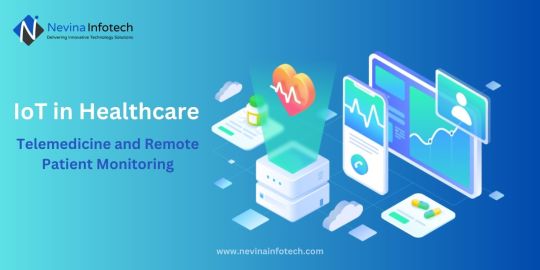
IoT In Healthcare
The benefits of IoT in healthcare through telemedicine and remote patient monitoring. Stay connected and provide effective care with IoT technology.
0 notes
Text
IoT is utilized in the healthcare industry for data collecting, research analysis, and the monitoring of electronic health records containing protected health information, personally identifiable information, and other machine-generated patient records.
#iot in healthcare market forecast#iot in healthcare market growth#iot in healthcare market trends#iot in healthcare market analysis report
0 notes
Text
Revolutionizing Healthcare: The Role of Cloud Computing in Modern Healthcare Technologies
In today’s digital era, cloud computing is transforming industries, and healthcare is no exception. The integration of cloud computing healthcare technologies is reshaping patient care, medical research, and healthcare management. Let’s explore how cloud computing is revolutionizing healthcare and the benefits it brings.

What is Cloud Computing in Healthcare?
Cloud computing in healthcare refers to the use of remote servers to store, manage, and process healthcare data, rather than relying on local servers or personal computers. This technology allows healthcare organizations to access vast amounts of data, collaborate with other institutions, and scale operations seamlessly.
Download PDF Brochure
Key Benefits of Cloud Computing in Healthcare
Enhanced Data Storage and Accessibility Cloud technology allows healthcare providers to store massive volumes of patient data, including medical records, images, and test results, securely. Clinicians can access this data from anywhere, ensuring that patient information is available for timely decision-making.
Improved Collaboration Cloud-based healthcare platforms enable easy sharing of patient data between healthcare providers, specialists, and labs. This facilitates better collaboration and more accurate diagnoses and treatment plans, especially in multi-disciplinary cases.
Cost Efficiency The cloud reduces the need for expensive hardware, software, and in-house IT teams. Healthcare providers only pay for the resources they use, making it a cost-effective solution. Additionally, the scalability of cloud systems ensures they can grow as healthcare organizations expand.
Better Data Security Protecting sensitive patient information is critical in healthcare. Cloud computing providers invest heavily in data security measures such as encryption, multi-factor authentication, and regular audits, ensuring compliance with regulatory standards like HIPAA.
Telemedicine and Remote Patient Monitoring Cloud computing powers telemedicine platforms, allowing patients to consult with doctors virtually, from the comfort of their homes. It also enables remote patient monitoring, where doctors can track patients' health metrics in real time, improving outcomes for chronic conditions.
Advanced Data Analytics The cloud supports the integration of advanced data analytics tools, including artificial intelligence (AI) and machine learning (ML), which can analyze large datasets to predict health trends, track disease outbreaks, and personalize treatment plans based on individual patient data.
Use Cases of Cloud Computing in Healthcare
Electronic Health Records (EHRs): Cloud-based EHRs allow healthcare providers to access and update patient records instantly, improving the quality of care.
Genomics and Precision Medicine: Cloud computing accelerates the processing of large datasets in genomics, supporting research and development in personalized medicine.
Hospital Information Systems (HIS): Cloud-powered HIS streamline hospital operations, from patient admissions to billing, improving efficiency.
Challenges in Cloud Computing for Healthcare
Despite its numerous benefits, there are challenges to implementing cloud computing in healthcare. These include:
Data Privacy Concerns: Although cloud providers offer robust security measures, healthcare organizations must ensure their systems are compliant with local and international regulations.
Integration with Legacy Systems: Many healthcare institutions still rely on outdated technology, making it challenging to integrate cloud solutions smoothly.
Staff Training: Healthcare professionals need adequate training to use cloud-based systems effectively.
Request Sample Pages
The Future of Cloud Computing in Healthcare
The future of healthcare will be increasingly cloud-centric. With advancements in AI, IoT, and big data analytics, cloud computing will continue to drive innovations in personalized medicine, population health management, and patient care. Additionally, with the growing trend of wearable devices and health apps, cloud computing will play a crucial role in integrating and managing data from diverse sources to provide a comprehensive view of patient health.
Conclusion
Cloud computing is not just a trend in healthcare; it is a transformative force driving the industry towards more efficient, secure, and patient-centric care. As healthcare organizations continue to adopt cloud technologies, we can expect to see improved patient outcomes, lower costs, and innovations that were once thought impossible.
Embracing cloud computing in healthcare is essential for any organization aiming to stay at the forefront of medical advancements and patient care.
Content Source:
2 notes
·
View notes
Text
5 Trends in ICT
Exploring the 5 ICT Trends Shaping the Future The Information and Communication Technology (ICT) landscape is evolving at a rapid pace, driven by advancements that are transforming how we live, work, and interact. Here are five key trends in ICT that are making a significant impact:
1. Convergence of Technologies
Technologies are merging into integrated systems, like smart devices that combine communication, media, and internet functions into one seamless tool. This trend enhances user experience and drives innovation across various sectors
Convergence technologies merge different systems, like smartphones combining communication and computing, smart homes using IoT, telemedicine linking healthcare with telecom, AR headsets overlaying digital on reality, and electric vehicles integrating AI and renewable energy.
2. Social Media
Social media platforms are central to modern communication and marketing, offering real-time interaction and advanced engagement tools. New features and analytics are making these platforms more powerful for personal and business use.
Social media examples linked to ICT trends include Facebook with cloud computing, TikTok using AI for personalized content, Instagram focusing on mobile technology, LinkedIn applying big data analytics, and YouTube leading in video streaming.
3. Mobile Technologies
Mobile technology is advancing with faster 5G networks and more sophisticated devices, transforming how we use smartphones and tablets. These improvements enable new applications and services, enhancing connectivity and user experiences.
Mobile technologies tied to ICT trends include 5G for high-speed connectivity, mobile payment apps in fintech, wearables linked to IoT, AR apps like Pokémon GO, and mobile cloud storage services like Google Drive.
4. Assistive Media
Assistive media technologies improve accessibility for people with disabilities, including tools like screen readers and voice recognition software. These innovations ensure that digital environments are navigable for everyone, promoting inclusivity.
Assistive media examples linked to ICT trends include screen readers for accessibility, AI-driven voice assistants, speech-to-text software using NLP, eye-tracking devices for HCI, and closed captioning on video platforms for digital media accessibility.
5. Cloud Computing
Cloud computing allows for scalable and flexible data storage and application hosting on remote servers. This trend supports software-as-a-service (SaaS) models and drives advancements in data analytics, cybersecurity, and collaborative tools.
Cloud computing examples related to ICT trends include AWS for IaaS, Google Drive for cloud storage, Microsoft Azure for PaaS, Salesforce for SaaS, and Dropbox for file synchronization.
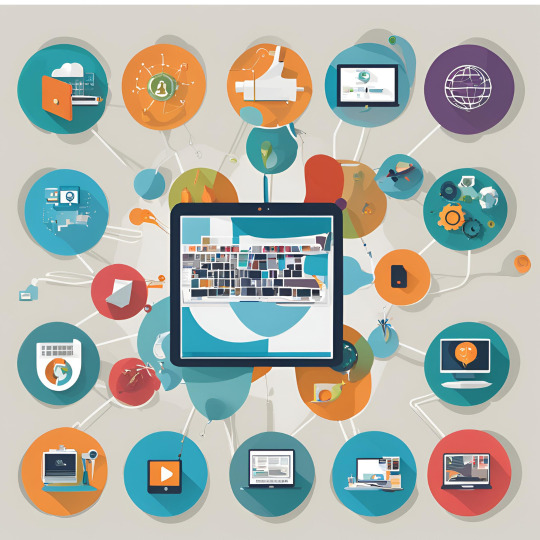
Submitted by: Van Dexter G. Tirado
3 notes
·
View notes
Link
Evolution of complementing technologies, such as Big Data and Artificial Intelligence drives the demand for an IoT (Internet of Things) in the healthcare...
0 notes
Text
5 trend of ICT
The information and communications technology (ICT)
Artificial Intelligence (AI) and Machine Learning (ML)
AI and ML are at the forefront of ICT innovation, enabling machines to learn from data and perform tasks that traditionally required human intelligence. This includes tasks like image recognition, natural language processing, and predictive analytics. AI and ML are being used in a wide range of applications, from self-driving cars to personalized medicine to fraud detection.
Edge Computing
Edge computing is a distributed computing paradigm that brings computing and data storage closer to the source of data, such as smartphones, sensors, and IoT devices. This reduces latency and improves performance, making it ideal for real-time applications and data-intensive tasks. Edge computing is becoming increasingly important as the volume of data generated by IoT devices continues to grow.
cybersecurity
With the increasing reliance on technology, cybersecurity has become a critical concern. Cyberattacks are becoming more sophisticated and widespread, targeting individuals, businesses, and governments. The ICT industry is responding with advanced security solutions, including threat intelligence, intrusion detection systems, and data encryption.
Blockchain
Blockchain is a distributed ledger technology that enables secure and transparent transactions. It is being used to develop applications in various sectors, including finance, supply chain management, and healthcare. Blockchain technology has the potential to revolutionize how we interact with each other and with businesses.
Virtual Reality (VR) and Augmented Reality (AR)
VR and AR technologies are creating immersive experiences that blur the lines between the physical and digital worlds. VR immerses users in a simulated environment, while AR overlays digital information onto the real world. These technologies are being used in gaming, entertainment, education, and training.
In conclusion, these five trends are shaping the future of ICT, driving innovation and transforming how we live, work, and interact with the world. As these technologies continue to evolve, we can expect to see even more exciting developments
2 notes
·
View notes
Text
Transforming the Health Landscape: The Global Blockchain in Healthcare Market
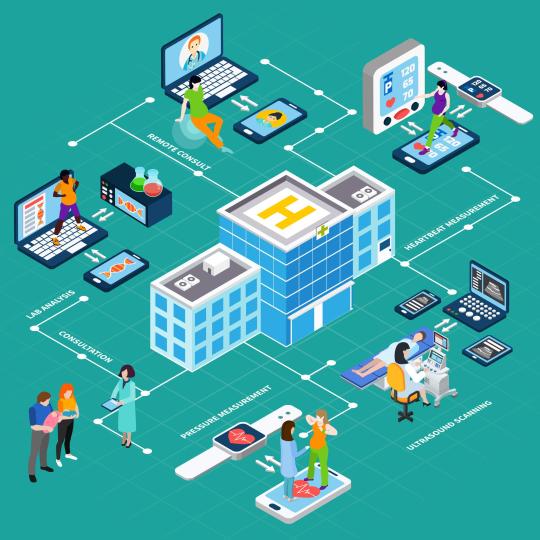
The integration of blockchain technology into the healthcare sector is revolutionizing the way medical data is managed, shared, and secured. As the demand for transparent, efficient, and secure healthcare services grows, blockchain offers promising solutions to longstanding challenges.
Understanding Blockchain in Healthcare
Blockchain Technology is a decentralized digital ledger that records transactions across multiple computers in a way that ensures the security and transparency of data. In healthcare, blockchain can be used to manage patient records, track pharmaceuticals, ensure the integrity of clinical trials, and streamline administrative processes. The immutable nature of blockchain helps in preventing data breaches, ensuring data accuracy, and enhancing patient privacy.
According to BIS Research, the Global Blockchain in Healthcare Market was estimated to grow to a value of $5.61 billion by 2025, and still the market is showing a steep growth till 2030 witnessing a double-digit CAGR growth rate throughout the forecast period.
Key Market Dynamics
Several factors are driving the growth of the global blockchain in healthcare market:
Data Security and Privacy:
Need for robust data security and privacy solutions.
Healthcare data breaches are a growing concern.
Blockchain's secure, immutable nature protects sensitive patient information.
Interoperability and Data Sharing:
Facilitates seamless data sharing between healthcare providers and systems.
Overcomes current interoperability issues.
Leads to better patient outcomes by providing a comprehensive view of health history.
Supply Chain Transparency:
Tracks the entire lifecycle of drugs in the pharmaceutical industry.
Ensures the authenticity of medications.
Helps combat counterfeit drugs.
Efficient Administrative Processes:
Streamlines various administrative processes, such as billing and claims management.
Reduces fraud and administrative costs.
Support from Regulatory Bodies:
Increasing support from regulatory bodies and governments.
Initiatives by FDA and EMA to explore blockchain for drug traceability and clinical trials boost market growth.
Request for an updated Research Report on Global Blockchain in Healthcare Market Research.
Global Blockchain in Healthcare Industry Segmentation
Segmentation by Application:
Data Exchange and Interoperability
Supply Chain Management
Claims Adjudication and Billing Management
Clinical Trials and Research
Others
Segmentation by End-User:
Healthcare Providers
Pharmaceutical Companies
Payers
Others
Segmentation by Region:
North America
Europe
Asia-Pacific
Latin America and Middle East & Africa
Future Market Prospects
The future of the global blockchain in healthcare market looks promising, with several trends likely to shape its trajectory:
Integration with AI and IoT: The integration of blockchain with artificial intelligence (AI) and the Internet of Things (IoT) will enhance data analytics, predictive healthcare, and real-time monitoring.
Expansion of Use Cases: New use cases for blockchain in digital healthcare will emerge, including patient-centered care models, personalized medicine, and enhanced telemedicine services.
Focus on Patient-Centric Solutions: Blockchain will enable more patient-centric healthcare solutions, empowering patients with greater control over their health data and enhancing patient engagement.
Development of Regulatory Frameworks: The establishment of clear regulatory frameworks and industry standards will facilitate the widespread adoption of blockchain in healthcare.
Conclusion
The Global Blockchain in Healthcare Industry is poised for significant growth, driven by the need for enhanced data security, interoperability, supply chain transparency, and efficient administrative processes. By addressing challenges related to regulatory compliance, implementation costs, standardization, and scalability, and leveraging opportunities in technological advancements, investments, partnerships, and government initiatives, the potential of blockchain in healthcare can be fully realized. This technology promises to revolutionize healthcare delivery, enhancing efficiency, transparency, and patient outcomes, and setting new standards for the future of digital health.
#Blockchain in Healthcare Market#Blockchain in Healthcare Industry#Blockchain in Healthcare Market Report#Blockchain in Healthcare Market Research#Blockchain in Healthcare Market Forecast#Blockchain in Healthcare Market Analysis#Blockchain in Healthcare Market Growth#BIS Research#Healthcare
2 notes
·
View notes
Text
Mastering DevOps: A Path to Tech Leadership and Innovation
In the ever-evolving landscape of technology, DevOps stands out as an indicator of innovation and efficiency. As we navigate the digital age, the role of DevOps, which seamlessly blends development and operations practices, has become increasingly important. It not only accelerates software delivery but also promotes collaboration, enhances automation, and ensures the delivery of high-quality applications. If you're considering a career in tech, DevOps is an enticing and promising option. In this comprehensive exploration, we'll dive deep into the world of DevOps careers, unveiling the manifold opportunities, challenges, and avenues for growth that it offers.

Why DevOps? The Irresistible Appeal
1. High Demand for DevOps Professionals
In a world where businesses are constantly striving for efficiency and agility, DevOps professionals are in high demand. Organizations of all sizes, from startups to Fortune 500 giants, recognize the value of DevOps in streamlining development processes, enhancing automation, and improving collaboration among cross-functional teams. This demand translates into a plethora of job opportunities for DevOps experts.
2. Competitive Salaries
In the realm of tech careers, compensation is often a significant factor. DevOps practitioners frequently enjoy competitive salaries, and experienced DevOps engineers, in particular, are handsomely rewarded. This makes DevOps not only a fulfilling career but also a financially rewarding one.
3. Versatility Across Industries
One of the striking features of a DevOps career is its versatility. DevOps skills are transferable across various industries, including finance, healthcare, e-commerce, and more. The fundamental principles and tools of DevOps are universally applicable, allowing you to explore different sectors while leveraging your expertise.
4. Continuous Learning and Adaptation
The tech world thrives on change, and DevOps is no exception. This dynamic field continuously evolves with the emergence of new tools and practices. Staying updated with the latest trends and technologies is not just a requirement but a thrilling aspect of a DevOps career. The pursuit of knowledge and adaptation are ingrained in the DevOps culture.
5. Enhanced Efficiency Through Automation
At the core of DevOps lies the principle of automation. DevOps practices emphasize automating manual processes, reducing errors, and accelerating deployment cycles. The result is enhanced efficiency in development pipelines, enabling teams to deliver software faster and with higher quality.
6. Collaboration as a Core Value
DevOps promotes collaboration and communication between traditionally siloed teams, such as development and operations. This cultural shift towards teamwork and shared responsibilities fosters a more inclusive and productive workplace environment.
7. A Path to Leadership
A DevOps career is not just about technical skills; it's also a pathway to leadership positions. As you gain experience and expertise, you'll find yourself well-equipped to step into roles like DevOps manager, architect, or consultant, where you can influence and shape the DevOps practices of your organization.
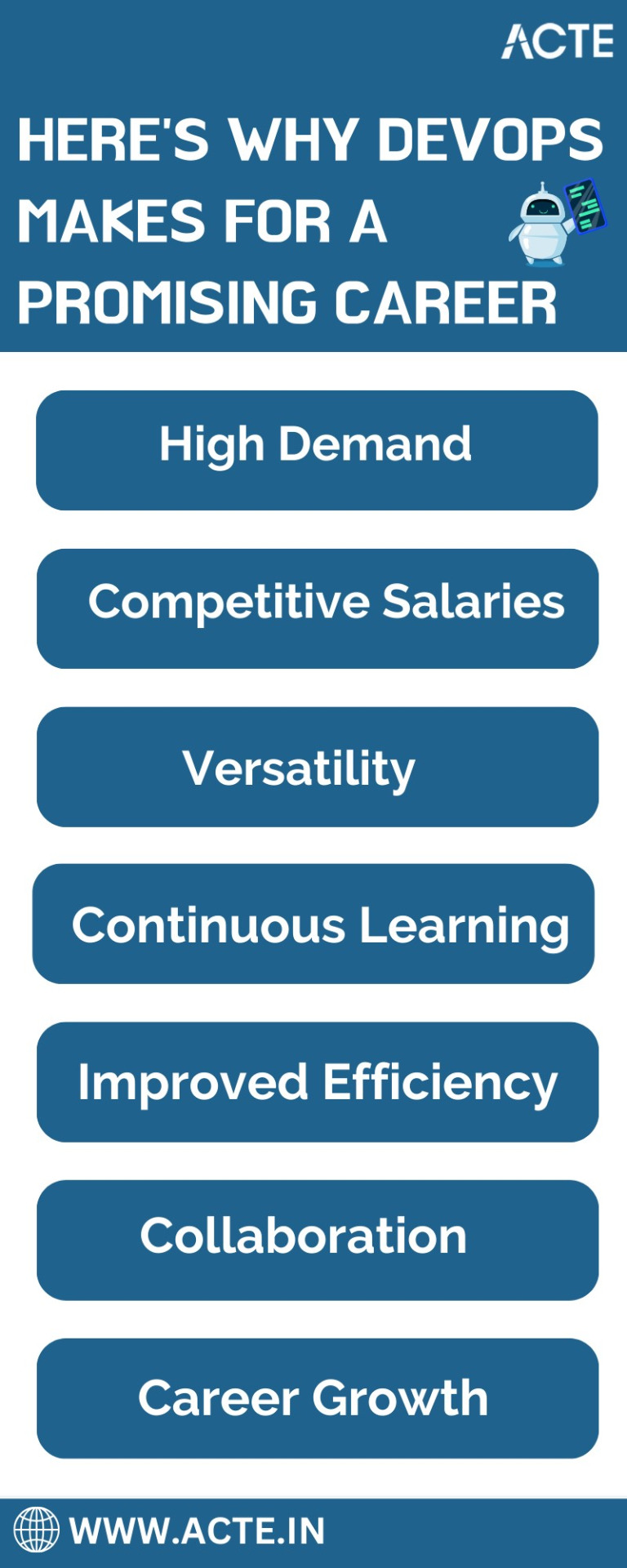
The Future of DevOps: A World of Innovation
As we peer into the future, the DevOps landscape promises even more exciting developments:
1. Advanced Automation and AI
Automation will continue to be a driving force in DevOps, with artificial intelligence (AI) playing a more significant role. AI-powered tools will enhance predictive analytics, optimize resource allocation, and further reduce manual intervention in the software development lifecycle.
2. DevOps in Edge Computing
The rise of edge computing, driven by the Internet of Things (IoT), presents new challenges and opportunities for DevOps. DevOps practices will expand to accommodate the unique demands of edge environments, enabling real-time data processing and analysis at the edge of the network.
3. Security-First DevOps
With cybersecurity concerns on the rise, DevOps will place an even greater emphasis on security practices. DevSecOps, the integration of security into the DevOps pipeline, will become standard practice, ensuring that security is not an afterthought but an integral part of the development process.
4. Hybrid and Multi-Cloud DevOps
Hybrid and multi-cloud environments are becoming increasingly prevalent. DevOps will continue to evolve to seamlessly integrate on-premises and cloud resources, providing organizations with the flexibility to choose the best infrastructure for their needs.
5. DevOps as a Service
DevOps as a Service (DaaS) is gaining traction. Organizations will increasingly turn to third-party providers for DevOps solutions, allowing them to focus on their core competencies while leveraging the expertise of specialized DevOps teams.
In a world driven by technology, a career in DevOps offers an exciting journey filled with opportunities for growth and innovation. Whether you're just starting your career or looking to make a transition, DevOps holds the promise of a rewarding path.
To embark on this journey, it's essential to equip yourself with the right skills and knowledge. ACTE Technologies, a renowned provider of DevOps training and certification programs, stands ready to be your guiding light. Their expert-led courses can help you build a complex foundation in DevOps principles, master the relevant tools, and stay ahead in this ever-evolving field.
So, embrace the future of technology with a career in DevOps, and let ACTE Technologies be your trusted companion on the road to excellence. As you explore the endless possibilities of DevOps careers, may your passion for innovation and your commitment to continuous learning lead you to success and fulfillment.
11 notes
·
View notes
Text
The Future of AWS: Innovations, Challenges, and Opportunities
As we stand on the top of an increasingly digital and interconnected world, the role of cloud computing has never been more vital. At the forefront of this technological revolution stands Amazon Web Services (AWS), a A leader and an innovator in the field of cloud computing. AWS has not only transformed the way businesses operate but has also ignited a global shift towards cloud-centric solutions. Now, as we gaze into the horizon, it's time to dive into the future of AWS—a future marked by innovations, challenges, and boundless opportunities.

In this exploration, we will navigate through the evolving landscape of AWS, where every day brings new advancements, complex challenges, and a multitude of avenues for growth and success. This journey is a testament to the enduring spirit of innovation that propels AWS forward, the challenges it must overcome to maintain its leadership, and the vast array of opportunities it presents to businesses, developers, and tech enthusiasts alike.
Join us as we embark on a voyage into the future of AWS, where the cloud continues to shape our digital world, and where AWS stands as a beacon guiding us through this transformative era.
Constant Innovation: The AWS Edge
One of AWS's defining characteristics is its unwavering commitment to innovation. AWS has a history of introducing groundbreaking services and features that cater to the evolving needs of businesses. In the future, we can expect this commitment to innovation to reach new heights. AWS will likely continue to push the boundaries of cloud technology, delivering cutting-edge solutions to its users.
This dedication to innovation is particularly evident in AWS's investments in machine learning (ML) and artificial intelligence (AI). With services like Amazon SageMaker and AWS Deep Learning, AWS has democratized ML and AI, making these advanced technologies accessible to developers and businesses of all sizes. In the future, we can anticipate even more sophisticated ML and AI capabilities, empowering businesses to extract valuable insights and create intelligent applications.
Global Reach: Expanding the AWS Footprint
AWS's global infrastructure, comprising data centers in numerous regions worldwide, has been key in providing low-latency access and backup to customers globally. As the demand for cloud services continues to surge, AWS's expansion efforts are expected to persist. This means an even broader global presence, ensuring that AWS remains a reliable partner for organizations seeking to operate on a global scale.
Industry-Specific Solutions: Tailored for Success
Every industry has its unique challenges and requirements. AWS recognizes this and has been increasingly tailoring its services to cater to specific industries, including healthcare, finance, manufacturing, and more. This trend is likely to intensify in the future, with AWS offering industry-specific solutions and compliance certifications. This ensures that organizations in regulated sectors can leverage the power of the cloud while adhering to strict industry standards.
Edge Computing: A Thriving Frontier
The rise of the Internet of Things (IoT) and the growing importance of edge computing are reshaping the technology landscape. AWS is positioned to capitalize on this trend by investing in edge services. Edge computing enables real-time data processing and analysis at the edge of the network, a capability that's becoming increasingly critical in scenarios like autonomous vehicles, smart cities, and industrial automation.
Sustainability Initiatives: A Greener Cloud
Sustainability is a primary concern in today's mindful world. AWS has already committed to sustainability with initiatives like the "AWS Sustainability Accelerator." In the future, we can expect more green data centers, eco-friendly practices, and a continued focus on reducing the harmful effects of cloud services. AWS's dedication to sustainability aligns with the broader industry trend towards environmentally responsible computing.
Security and Compliance: Paramount Concerns
The ever-growing importance of data privacy and security cannot be overstated. AWS has been proactive in enhancing its security services and compliance offerings. This trend will likely continue, with AWS introducing advanced security measures and compliance certifications to meet the evolving threat landscape and regulatory requirements.
Serverless Computing: A Paradigm Shift
Serverless computing, characterized by services like AWS Lambda and AWS Fargate, is gaining rapid adoption due to its simplicity and cost-effectiveness. In the future, we can expect serverless architecture to become even more mainstream. AWS will continue to refine and expand its serverless offerings, simplifying application deployment and management for developers and organizations.
Hybrid and Multi-Cloud Solutions: Bridging the Gap
AWS recognizes the significance of hybrid and multi-cloud environments, where organizations blend on-premises and cloud resources. Future developments will likely focus on effortless integration between these environments, enabling businesses to leverage the advantages of both on-premises and cloud-based infrastructure.
Training and Certification: Nurturing Talent
AWS professionals with advanced skills are in more demand. Platforms like ACTE Technologies have stepped up to offer comprehensive AWS training and certification programs. These programs equip individuals with the skills needed to excel in the world of AWS and cloud computing. As the cloud becomes increasingly integral to business operations, certified AWS professionals will continue to be in high demand.
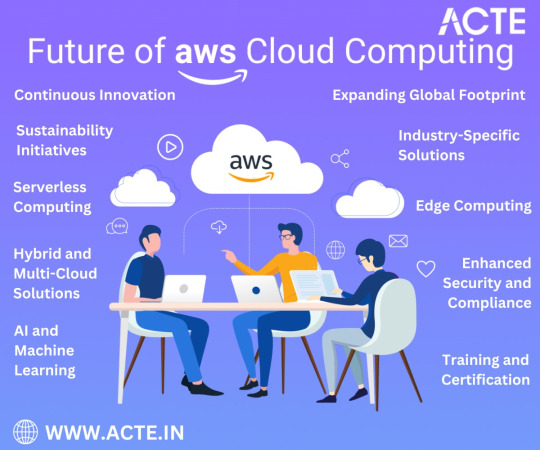
In conclusion, the future of AWS shines brightly with promise. As a expert in cloud computing, AWS remains committed to continuous innovation, global expansion, industry-specific solutions, sustainability, security, and empowering businesses with advanced technologies. For those looking to embark on a career or excel further in the realm of AWS, platforms like ACTE Technologies offer industry-aligned training and certification programs.
As businesses increasingly rely on cloud services to drive their digital transformation, AWS will continue to play a key role in reshaping industries and empowering innovation. Whether you are an aspiring cloud professional or a seasoned expert, staying ahead of AWS's evolving landscape is most important. The future of AWS is not just about technology; it's about the limitless possibilities it offers to organizations and individuals willing to embrace the cloud's transformative power.
8 notes
·
View notes